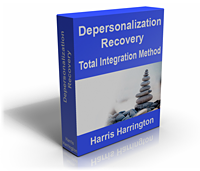Harris Harrington shows you a key technique for eliminating the deep causes of DP.

By Harris Harrington
In this article I am going to go over one of the techniques I talk about in my program Depersonalization Recovery: Total Integration Method. This technique is writing a personal narrative. In my program I go more in depth about how to actually do this. What I hope to convey in this article is the importance of resolving your trauma (the source of your DP) through writing your life narrative. On a neurobiological level, this can integrate the functioning of your brain, thus resolving the dissociation.
Depersonalization disorder is a dissociative disorder. It is an automatic dissociative response to unresolved trauma. It is a way that the brain can push the trauma out of consciousness.
In this disorder, people feel that they are not real. They feel that they are not living their lives.
Why is this? Doesn’t the fact that depersonalization disorder even exists at all tell us something about human beings in general, about the very nature of the human personality? How could this disorder be experienced by millions of people around the world?
It’s because depersonalization disorder and derealization are designed into the human brain as potential ways of dealing with pain.
The human brain is truly an amazing creation. You can think of it as a swiss army knife, consisting of many different functions. One switch on the swiss army knife of the brain is depersonalization disorder and derealization. This is a switch that can be flipped on any human brain when we haven’t processed our pain.
But what does it mean to have “unresolved trauma”? What does it mean to feel cut off from our own life, to feel cut off from our own selves? Why would our brain create these sensations?
In order to understand these questions, we have to understand how the human brain processes information. So, how do humans process information?
What is the biggest section in the bookstore? Literature. Why is this? Why do people want to read stories?
Let’s think about the most popular religions in the world. Christianity, Islam, Buddhism, and Hinduism. What is at the core of all these religions, which influence the lives of billions of people on our planet?
At the core of all of these religions are stories about people, in particular narratives about personified deities, gurus, or spiritual leaders. Religion shares much in common with literature, because most of the messages are contained in narratives and stories.
When you realize that, even despite the advent of science, the primary way people process information is through narrative, this radically changes the way we should think about depersonalization disorder. The human brain is literally designed to process information primarily through a narrative, a story.
In my video program on depersonalization, I talk about developing a personal narrative as a way of writing about your emotional trauma, overcoming your pain, and curing depersonalization.
So let’s reexamine the question, why does depersonalization happen when we have unresolved trauma? What does it mean to have “unresolved” trauma? How does one go about “resolving” trauma?
Trauma becomes unresolved when it is too painful for us to think about, or “consciously process”. So, if depersonalization is caused by pushing out information from conscious awareness (in particular, information about traumatic experiences and aspects of our self), then it logically follows that we have to start thinking about the trauma again. You have to bring the trauma back into your conscious awareness.
In order to rid yourself of depersonalization and derealization you need to process information related to traumatic experiences.
But remember, what is the primary way human beings process information? Narratives! Stories!
What does this mean? It means we have to write our story! Yes, as corny as it may sound, you are living a story. You can think of depersonalization as missing pages on the novel of your life. When you fill in the missing pages, you will feel reconnected with your life.
When you write about your experience, you are literally re-owning your life. You become repersonalized when you feel connected with your life story, when you reclaim your role as the lead protagonist. You will see how you got to where you are today. At first, simply hashing out our autobiographical details can be immensely therapeutic. Through constructing a narrative you can truly make sense of your life and your self.
People with depersonalization feel cut off from everything. They don’t feel real. They think about existential issues all day long, but haven’t put much thought into their life, or trying to understand it.
When people go to therapy, much of the time they are simply learning things about themselves they were never aware of before. They are literally bringing aspects of their experience into conscious awareness. Maybe they never realized how their behavior effected other people, or why they keep experiencing the same problems over and over again.
A trained therapist helps them essentially construct a narrative of their life orally through a continuing conversation, a back and forth dialogue.
You can go through this process much more expediently by writing a brief synopsis of your life, paying attention to your emotions, how your thinking has changed over time (metacognition), and weaving these elements together. This enhances your reflective capability. You will validate your own life story by simply writing it down.
The point of my video program is to give you a huge amount of information that can help you understand your trauma. If you were to try and write your narrative without any education in psychology, you would have trouble pinpointing such things as codependence, emotional abuse, and various elements of personality disorders.
Once you become aware of your trauma, you then need to write about it.
You will then re-own your experience and your sense of self.
